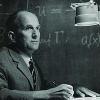Well, potential infinity and actual infinity go along with their descriptors with the fact that something has the potential to be infinite while the other is actually infinity.
For example, there is a difference between a set that has the potential to be infinite and a set that is actually infinitely large. One has the capabilities to be infinite because no constraints have been put in place for that set to not be infinite while a set that is actually infinitely large does have infinite sets.
A limit would be a mediocre example because though it does seem to imply such comparisons, it doesn't do a very good job of it. For example, Zeno's paradox would not be a good example.
This is an example of a limit because it shows that if we were to finitely calculate the distance he travels he would never reach the tortoise. However, if a limit is used then he does reach the tortoise. The potential infinity stage is that Achilles has the potential to reach the tortoise because of the equation behind his differences of distance between him and the tortoise. However, with actual infinity he does reach the tortoise.
The difference lies within possibility and actuality.
Now, I wanted to address something you wrote in the post:
I don't know what he meant by "infinities cannot exist in reality" because they do exist in nature, however not in the ways we would expect them in mathematics. As we know of, black holes either have a really, really, REALLY large density or their density is infinitely large because of how they work. But, I think the person misrepresented Craig's arguments since I have watched some of the debates between him and Lawrence.
Craig's argument deals with the idea of an infinite lapse of time at the beginning of the Universe. His argument states that if there is no creator of the Universe and that the Universe has always existed then the beginning of time has, in fact, no "beginning" because the Universe has existed for an infinite amount of time and, therefore, there is no way to determine beginning relative to a certain aspect in time.
However, I think Lawrence's rebuttal to the argument was that since space-time at the singularity did not allow time to pass, therefore this would account for such an issue but I do not remember so don't quote me on this.
Just to note, this post is not in favor of either Craig's or Lawrence argument. I simply giving a clarification.





